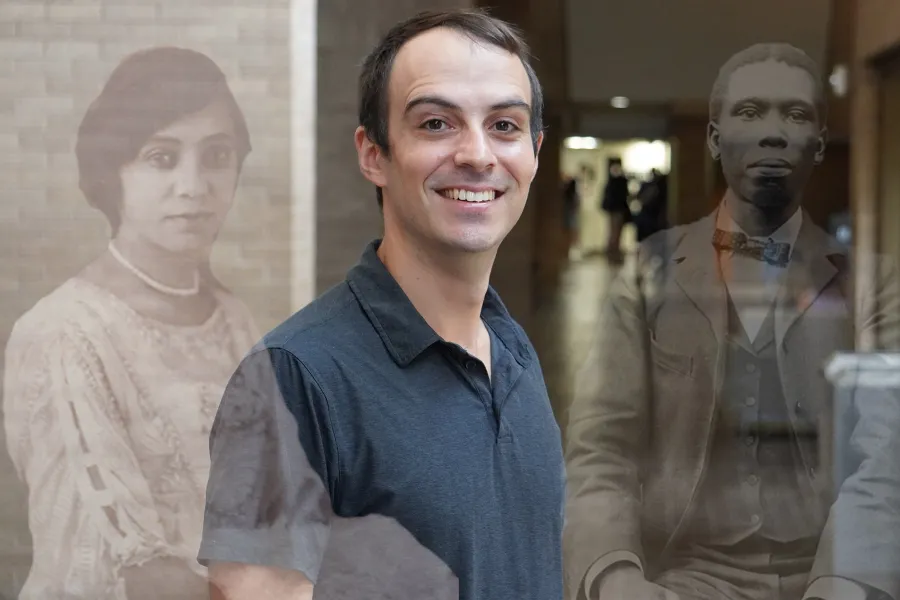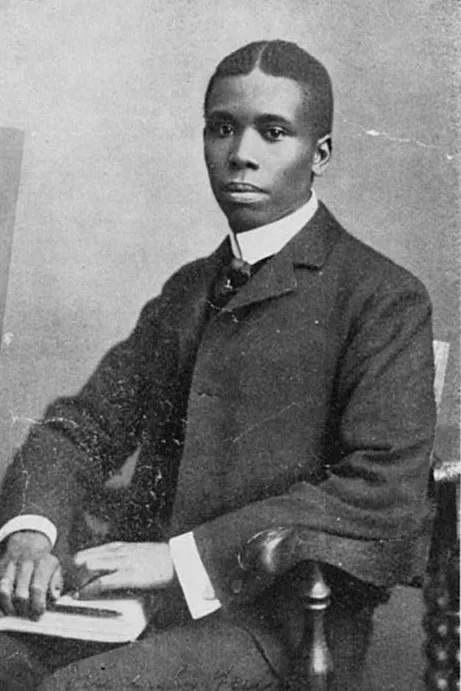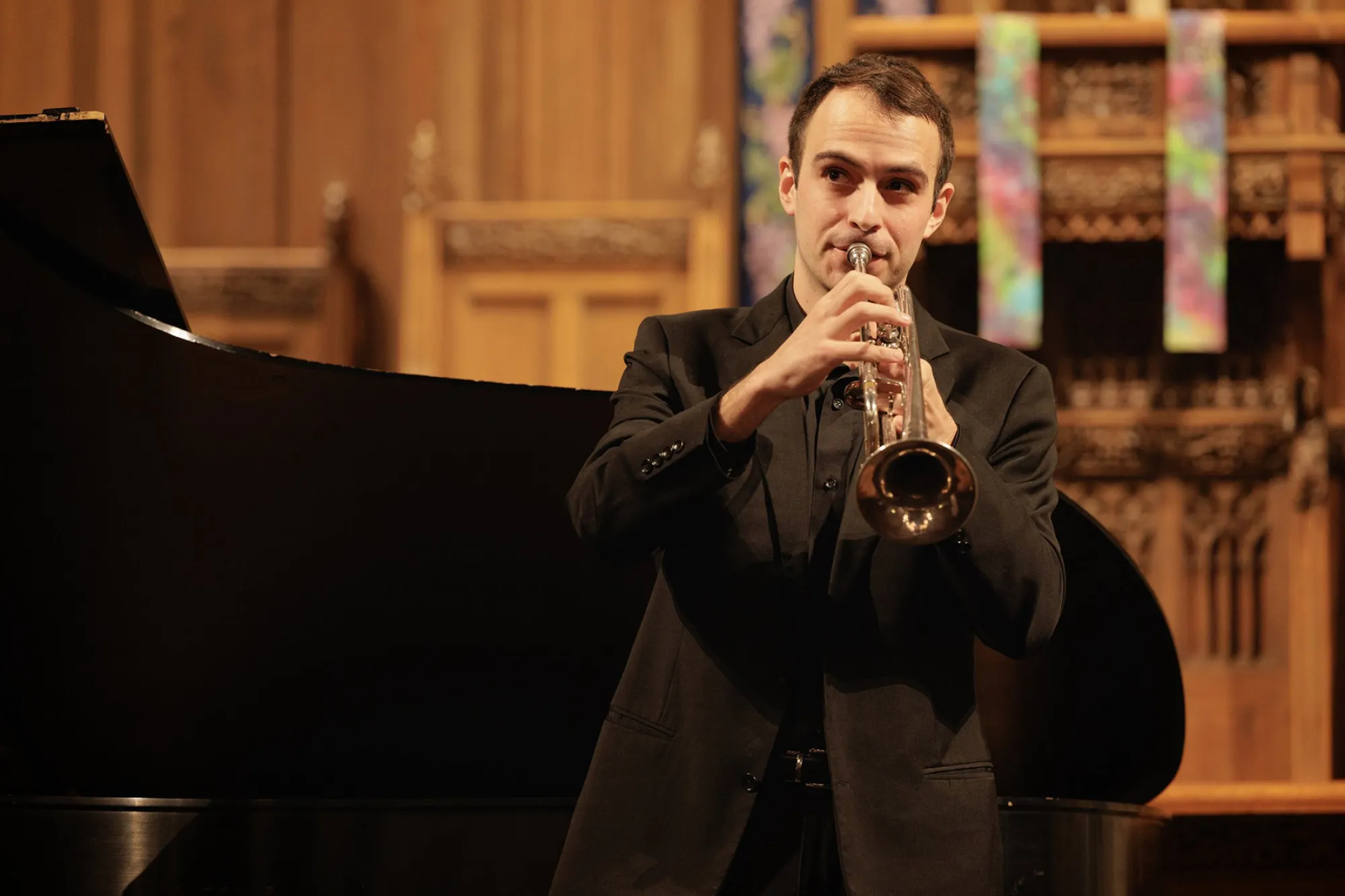September 25, 2024

Five years ago, while living in Chicago and performing with Axiom Brass, future Butler D.M.A. student Michael Hawes heard trombonist Corey Sansolo transcribe a string quartet by Florence Price. Little did he know that this moment would profoundly change his life and ignite a passion for uncovering music from some of the country’s darkest periods.
After hearing the piece, Michael returned home and searched for Florence Price on YouTube. He aimed to find songs for voice and piano and stumbled upon a collection of 44 art songs and spirituals. “They are incredibly beautiful pieces, rich in romantic melodies,” he recalls. “I was instantly captivated by these songs and knew I had to perform them.” To his surprise, he discovered that many of her works had only recently been discovered, and not yet performed or recorded. “I realized that many had never been recorded,” he reflects, which sparked a true calling within him. “I felt compelled to sing and perform these pieces.”
Florence Price was an African American woman born just over 20 years after the last slaves were emancipated on June 19, 1865. Born in Little Rock, Arkansas, she quickly demonstrated her musical talent, performing her first recital at just four years old and publishing her first piece of music at eleven. She later attended the New England Conservatory of Music and became widely known as the first African American woman to be a symphony composer, with her pieces performed by major orchestras.

A Young Florence Price
Despite her success, the ghosts of America’s past continued to haunt her. She faced racism throughout her life, often having to write under a pen name or pass as Mexican to lessen the racial discrimination. A lynching in Little Rock forced her family to flee north to Chicago, where she would spend the rest of her life.
Her music is both beautiful and unique, fusing her classical training with elements of church music and African American folk songs and spirituals. Throughout her writing, she often found inspiration in the works of poets. One notable figure was Paul Laurence Dunbar, who penned the lyrics to seven songs on the album. Dunbar's words resonated deeply with both Michael and Florence Price. Michael observed, “Dunbar was the child of formerly enslaved peoples, and his words capture the perspective of a Black American in the late 19th and early 20th centuries.” His verses come alive, vividly portraying the beauty and struggles of that time, which was crucial for Michael—reviving these powerful words for a new audience.

Paul Laurence Dunbar
Track 9: Sympathy
Words by Paul Laurence Dunbar
I know what the caged bird feels, alas!
When the sun is bright on the upland slopes;
When the wind stirs soft through the springing grass,
And the river flows like a stream of glass;
When the first bird sings and the first bud opes,
And the faint perfume from its chalice steals—
I know what the caged bird feels!
I know why the caged bird beats his wing
Till its blood is red on the cruel bars;
For he must fly back to his perch and cling
When he fain would be on the bough a-swing;
And a pain still throbs in the old, old scars
And they pulse again with a keener sting—
I know why he beats his wing!
I know why the caged bird sings, ah me,
When his wing is bruised and his bosom sore—
When he beats his bars and he would be free;
It is not a carol of joy or glee,
But a prayer that he sends from his heart’s deep core,
But a plea that upward to Heaven he flings—
I know why the caged bird sings!
As a trumpet player and vocalist, Michael knew that the album would feature an octet for brass and piano—a piece that had never been commercially recorded before—and he was certain it would be the centerpiece of the album. He also planned for the remaining 17 songs to feature him singing with a pianist. He selected songs “that spoke to me” and made an effort to choose pieces that had not been recorded previously.
The first step was finding a collaborator. He recalled a pianist who had been a fellow student many years ago. Impressed by her remarkable playing, he reached out to Eugenia Jeong, who was now the head of the piano department at the University of Chicago. Contacting her out of the blue, he was pleased when she agreed to collaborate.

Michael Hawes playing trumpet
The second major hurdle was renting the music. Normally, this is a straightforward process, but because 15 of the 22 tracks had never been professionally recorded before, the publisher was missing some of the parts. Michael had to contact the person who originally transcribed the music to supplement the publisher's version and stay true to the original compositions by Florence Price.
There was a lot of prep work, but the entire album was recorded in just three days. Although there were many rehearsals, the actual recording consisted of three four-hour sessions. To achieve this in such a short amount of time, Michael had to be hyper-organized, even going so far as to hire a conductor for the brass octet. “This piece is great for being performed without a conductor and allows a chamber music group to communicate and lead each other,” he said, but due to time constraints, “I had a conductor there just to streamline the process and help with all the starts and stops.”
Michael Hawes performing Because by Florence Price based on the poem Compensation by Paul Laurence Dunbar
Michael invested years of his life and substantial amounts of his own money to bring this project to fruition. His only goal was, “I hope the voice of Price and her spirit will live forever.” Despite all the ups and downs, he maintains a cheerful demeanor and seems even more passionate about the project now after all these years. After spending time with Michael and witnessing his endless positive energy for a project that will likely have little commercial success, I am reminded of the words to Track 22, written by Paul Laurence Dunbar.
What's the use o' folks a-frownin'
When the way's a little rough?
Frowns lay out the road fur smilin'
You'll be wrinkled soon enough.
What's the use?
What's the use o' folks a-sighin'?
It's an awful waste o' breath,
An' a body can't stand wastin'
What he needs so bad in death.
What's the use?
What's the use o' even weepin'?
Might as well go long an' smile.
Life, our longest, strongest arrow,
Only lasts a little while.
What's the use?
This sums up not only Michael as a person but his dedication to the craft and the album as a whole. While it was written on the memories of slavery and during a time of institutionalized racism, the album still sounds beautiful and uplifting. Track 21, with words by Langston Hughes, speaks about the bright future of tomorrow; well, their tomorrow is today, and people like Michael keep the flame and the march alive. I think Price, Dunbar, and Hughes would be proud.
Track 21: We Have Tomorrow
Words by Langston Hughes
We have tomorrow
Bright before us
Like a flame
Yesterday
A night-gone thing,
A sun-down name.
And dawn to-day
Broad arch above the road we came.
We march!
To purchase an album or see the album artwork and track visit https://www.one-voice-music.com/. You can also listen to it on almost all streaming platforms.
Brown, Rae Linda (2020). The Heart of a Woman: The Life and Music of Florence B. Price. Chicago: University of Illinois Press. ISBN 978-0252043239.

